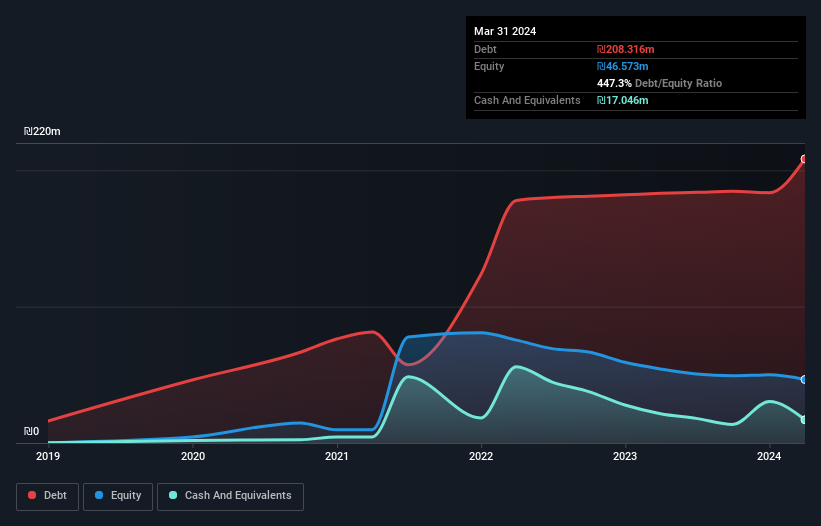- Israel
- /
- Renewable Energy
- /
- TASE:PRIM
Prime Energy P.E (TLV:PRIM) Has Debt But No Earnings; Should You Worry?
Some say volatility, rather than debt, is the best way to think about risk as an investor, but Warren Buffett famously said that 'Volatility is far from synonymous with risk.' So it might be obvious that you need to consider debt, when you think about how risky any given stock is, because too much debt can sink a company. We note that Prime Energy P.E. Ltd (TLV:PRIM) does have debt on its balance sheet. But the real question is whether this debt is making the company risky.
When Is Debt A Problem?
Debt and other liabilities become risky for a business when it cannot easily fulfill those obligations, either with free cash flow or by raising capital at an attractive price. In the worst case scenario, a company can go bankrupt if it cannot pay its creditors. However, a more usual (but still expensive) situation is where a company must dilute shareholders at a cheap share price simply to get debt under control. Of course, plenty of companies use debt to fund growth, without any negative consequences. The first thing to do when considering how much debt a business uses is to look at its cash and debt together.
Check out our latest analysis for Prime Energy P.E
What Is Prime Energy P.E's Net Debt?
The image below, which you can click on for greater detail, shows that at March 2024 Prime Energy P.E had debt of ₪208.3m, up from ₪183.1m in one year. However, it also had ₪17.0m in cash, and so its net debt is ₪191.3m.

How Healthy Is Prime Energy P.E's Balance Sheet?
According to the last reported balance sheet, Prime Energy P.E had liabilities of ₪46.0m due within 12 months, and liabilities of ₪195.2m due beyond 12 months. Offsetting these obligations, it had cash of ₪17.0m as well as receivables valued at ₪5.11m due within 12 months. So its liabilities outweigh the sum of its cash and (near-term) receivables by ₪219.0m.
When you consider that this deficiency exceeds the company's ₪152.2m market capitalization, you might well be inclined to review the balance sheet intently. In the scenario where the company had to clean up its balance sheet quickly, it seems likely shareholders would suffer extensive dilution. The balance sheet is clearly the area to focus on when you are analysing debt. But you can't view debt in total isolation; since Prime Energy P.E will need earnings to service that debt. So if you're keen to discover more about its earnings, it might be worth checking out this graph of its long term earnings trend.
In the last year Prime Energy P.E wasn't profitable at an EBIT level, but managed to grow its revenue by 48%, to ₪10m. With any luck the company will be able to grow its way to profitability.
Caveat Emptor
Despite the top line growth, Prime Energy P.E still had an earnings before interest and tax (EBIT) loss over the last year. Indeed, it lost ₪12m at the EBIT level. When we look at that alongside the significant liabilities, we're not particularly confident about the company. It would need to improve its operations quickly for us to be interested in it. Not least because it burned through ₪20m in negative free cash flow over the last year. So suffice it to say we consider the stock to be risky. There's no doubt that we learn most about debt from the balance sheet. But ultimately, every company can contain risks that exist outside of the balance sheet. Be aware that Prime Energy P.E is showing 5 warning signs in our investment analysis , and 3 of those are potentially serious...
If, after all that, you're more interested in a fast growing company with a rock-solid balance sheet, then check out our list of net cash growth stocks without delay.
New: Manage All Your Stock Portfolios in One Place
We've created the ultimate portfolio companion for stock investors, and it's free.
• Connect an unlimited number of Portfolios and see your total in one currency
• Be alerted to new Warning Signs or Risks via email or mobile
• Track the Fair Value of your stocks
Have feedback on this article? Concerned about the content? Get in touch with us directly. Alternatively, email editorial-team (at) simplywallst.com.
This article by Simply Wall St is general in nature. We provide commentary based on historical data and analyst forecasts only using an unbiased methodology and our articles are not intended to be financial advice. It does not constitute a recommendation to buy or sell any stock, and does not take account of your objectives, or your financial situation. We aim to bring you long-term focused analysis driven by fundamental data. Note that our analysis may not factor in the latest price-sensitive company announcements or qualitative material. Simply Wall St has no position in any stocks mentioned.
Have feedback on this article? Concerned about the content? Get in touch with us directly. Alternatively, email editorial-team@simplywallst.com
About TASE:PRIM
Prime Energy P.E
Engages in the initiating, planning, developing, financing, constructing, managing, licensing, and operating of solar energy projects in Israel and internationally.
Mediocre balance sheet with minimal risk.
Market Insights
Weekly Picks


Crazy Undervalued 42 Baggers Silver Play (Active & Running Mine)


Fiducian: Compliance Clouds or Value Opportunity?

Willamette Valley Vineyards (WVVI): Not-So-Great Value
Recently Updated Narratives


Positioned globally, partnered locally


When will fraudsters be investigated in depth. Fraud was ongoing in France too.


Staggered by dilution; positions for growth
Popular Narratives


MicroVision will explode future revenue by 380.37% with a vision towards success


NVDA: Expanding AI Demand Will Drive Major Data Center Investments Through 2026





